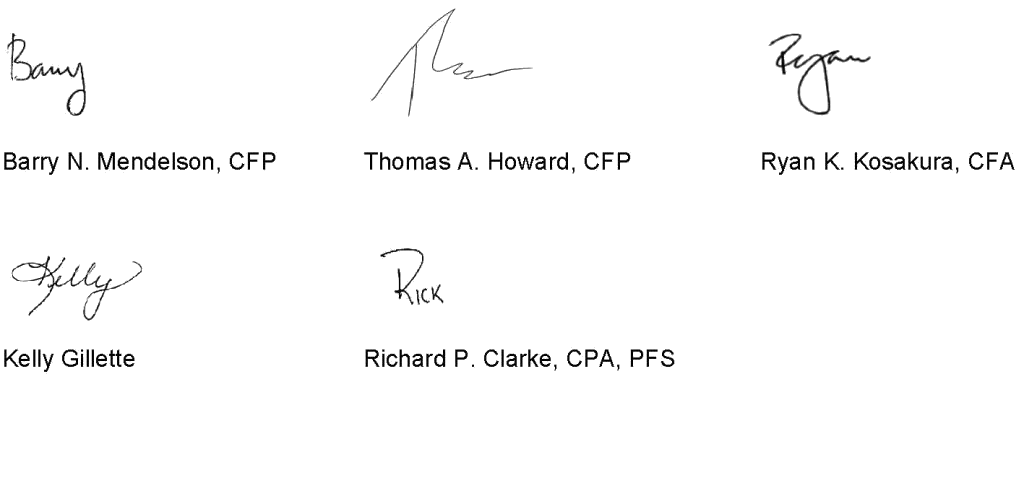In this issue:
- Are free trades really free?
- Update on California Assembly Bill 211 (AB211)
Happy Holidays from all of us at Elevation Wealth Partners. Wishing you health, happiness, and prosperity in 2020 and beyond

In recognition of your confidence and support, we have invested in the following community organizations:
Cancer Support Community of San Francisco Bay Area http://www.cancersupport.net
LifeWorks of Sonoma County http://www.lifeworkssc.org
Redwood Empire Mountain Bike Alliance http://www.mountainbikealliance.org
Tell us what community organization you support at info@zrcmw.com.
Are free trades really free?
On October 7th, Charles Schwab Corp. followed the move of rival brokerage company, Interactive Brokers Group, and eliminated online commissions on U.S. stocks, options and ETFs (baskets of securities that trade intra-day like stocks). In fact, the term “brokerage” is becoming a misnomer and firms like Schwab now seem more like banks than brokers. For example, in 2014 commissions amounted to 14% of Schwab’s total net revenues. However, by 2018, thanks to the continued migration from buying individual stocks to investing in mutual funds and especially ETFs, trading commissions totaled less than 7% of revenues for Schwab.
Most clients at Elevation Wealth Partners hold a few ETFs. Previously, online commissions at Schwab were just $4.95 a trade. Given that our clients’ accounts are rebalanced once or twice a year, trading commissions to Schwab totaled less than $100 a year . . . not a significant amount of money, nor a meaningful savings.
How can Schwab and others offer free trades? Schwab can offer free trading partly because of how it handles investors’ cash. Instead of investing idle cash into money-market funds or other assets that could yield about 1.5% at today’s rates, the firm sweeps idle cash into its own bank which pays peanuts. In many brokerage accounts, Schwab pays just 0.06% (less than 1/10 of 1%) and then turns around and lends it out at the Fed Funds rate of 1.50% – 1.75%. Since Schwab is part broker, part asset manager, and part federally regulated bank (though its Schwab Bank subsidiary), it’s estimated that client cash held at Schwab is more than $400 billion. Do the math and that spread pays for free trading and a whole lot more (some of which does benefit Schwab customers and clients of Elevation Wealth Partners). Despite the low yields, Charles Schwab remains our preferred custodian of clients assets.
Are there higher yielding options for your cash? In our April Newsletter, we discussed how to earn higher yields on your cash balances. At Elevation Wealth Partners, we direct clients that have significant cash balances (typically $50,000 or more) into money market investments that yield around 1.50% or ultra-short bond ETFs such as JPST or MINT.*
Update on California Assembly Bill 211 (AB211) regarding 529 Qualified Tuition / College Saving Plans
In our March Newsletter, we wrote about a bill that would allow a tax deduction for contributions to California’s 529 Scholarshare program. California is one of only seven states that has a state income tax AND does not provide a state-tax deduction or credit for contributions to 529 plans. The bill authored by Democratic Assembly Majority Leader Ian Calderon at the beginning of 2019 would have let Californian’s deduct up to $10,000 (married) or $5,000 (single) for contributions to one or more 529 ScholarShare accounts. Originally, the bill had no income limits and there were concerns that the biggest benefits would go to families in the highest tax brackets. An amendment restricted the deduction to taxpayers with adjusted gross income up to $150,000 (married filing jointly) or $75,000 (single).
Unfortunately, even though the bill passed the Senate and the Assembly with zero votes against, Governor Newsom returned the bill to the Legislature after it sat on his desk for several weeks without his signature. Governor Newsom said in his veto message; “While I appreciate the Legislature’s intent, a careful balancing of the proposed tax deduction in relation to the revenue losses, approximately $13 million, would be better addressed thought the annual budget process.” Regardless, Elevation Wealth Partners still strongly believes 529 Plans offer significant benefits. The plans we recommend the most are the Utah My529, Nevada Vanguard 529, and California 529 ScholarShare.*
As always, we are here to be a resource to you and those important to you.
Sincerely,

“Elevation Wealth Partners is unique because the client is the focus of our attention. They come first in everything we do and solutions are centered around them.”
Barry Mendelson, CFP
Wealth Advisor & Managing Partner
*Elevation Wealth Partners is not making a specific investment recommendation. Investment recommendations are only made after considering many factors including the investor’s specific goals, objectives, risk-tolerance, and time-horizon (among another things). All investing is subject to risk, including the possible loss of the money you invest. Past performance is no guarantee of future returns.
Happy Holidays From Elevation Wealth Partners, Are Free Trades Really Free? And More . . .
In this issue:
Happy Holidays from all of us at Elevation Wealth Partners. Wishing you health, happiness, and prosperity in 2020 and beyond


In recognition of your confidence and support, we have invested in the following community organizations:
Cancer Support Community of San Francisco Bay Area http://www.cancersupport.net
LifeWorks of Sonoma County http://www.lifeworkssc.org
Redwood Empire Mountain Bike Alliance http://www.mountainbikealliance.org
Tell us what community organization you support at info@zrcmw.com.
Are free trades really free?
On October 7th, Charles Schwab Corp. followed the move of rival brokerage company, Interactive Brokers Group, and eliminated online commissions on U.S. stocks, options and ETFs (baskets of securities that trade intra-day like stocks). In fact, the term “brokerage” is becoming a misnomer and firms like Schwab now seem more like banks than brokers. For example, in 2014 commissions amounted to 14% of Schwab’s total net revenues. However, by 2018, thanks to the continued migration from buying individual stocks to investing in mutual funds and especially ETFs, trading commissions totaled less than 7% of revenues for Schwab.
Most clients at Elevation Wealth Partners hold a few ETFs. Previously, online commissions at Schwab were just $4.95 a trade. Given that our clients’ accounts are rebalanced once or twice a year, trading commissions to Schwab totaled less than $100 a year . . . not a significant amount of money, nor a meaningful savings.
How can Schwab and others offer free trades? Schwab can offer free trading partly because of how it handles investors’ cash. Instead of investing idle cash into money-market funds or other assets that could yield about 1.5% at today’s rates, the firm sweeps idle cash into its own bank which pays peanuts. In many brokerage accounts, Schwab pays just 0.06% (less than 1/10 of 1%) and then turns around and lends it out at the Fed Funds rate of 1.50% – 1.75%. Since Schwab is part broker, part asset manager, and part federally regulated bank (though its Schwab Bank subsidiary), it’s estimated that client cash held at Schwab is more than $400 billion. Do the math and that spread pays for free trading and a whole lot more (some of which does benefit Schwab customers and clients of Elevation Wealth Partners). Despite the low yields, Charles Schwab remains our preferred custodian of clients assets.
Are there higher yielding options for your cash? In our April Newsletter, we discussed how to earn higher yields on your cash balances. At Elevation Wealth Partners, we direct clients that have significant cash balances (typically $50,000 or more) into money market investments that yield around 1.50% or ultra-short bond ETFs such as JPST or MINT.*
Update on California Assembly Bill 211 (AB211) regarding 529 Qualified Tuition / College Saving Plans
In our March Newsletter, we wrote about a bill that would allow a tax deduction for contributions to California’s 529 Scholarshare program. California is one of only seven states that has a state income tax AND does not provide a state-tax deduction or credit for contributions to 529 plans. The bill authored by Democratic Assembly Majority Leader Ian Calderon at the beginning of 2019 would have let Californian’s deduct up to $10,000 (married) or $5,000 (single) for contributions to one or more 529 ScholarShare accounts. Originally, the bill had no income limits and there were concerns that the biggest benefits would go to families in the highest tax brackets. An amendment restricted the deduction to taxpayers with adjusted gross income up to $150,000 (married filing jointly) or $75,000 (single).
Unfortunately, even though the bill passed the Senate and the Assembly with zero votes against, Governor Newsom returned the bill to the Legislature after it sat on his desk for several weeks without his signature. Governor Newsom said in his veto message; “While I appreciate the Legislature’s intent, a careful balancing of the proposed tax deduction in relation to the revenue losses, approximately $13 million, would be better addressed thought the annual budget process.” Regardless, Elevation Wealth Partners still strongly believes 529 Plans offer significant benefits. The plans we recommend the most are the Utah My529, Nevada Vanguard 529, and California 529 ScholarShare.*
As always, we are here to be a resource to you and those important to you.
Sincerely,
“Elevation Wealth Partners is unique because the client is the focus of our attention. They come first in everything we do and solutions are centered around them.”
Barry Mendelson, CFP
Wealth Advisor & Managing Partner
*Elevation Wealth Partners is not making a specific investment recommendation. Investment recommendations are only made after considering many factors including the investor’s specific goals, objectives, risk-tolerance, and time-horizon (among another things). All investing is subject to risk, including the possible loss of the money you invest. Past performance is no guarantee of future returns.